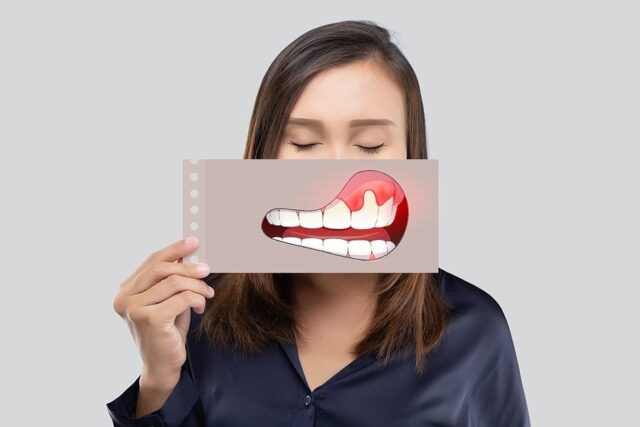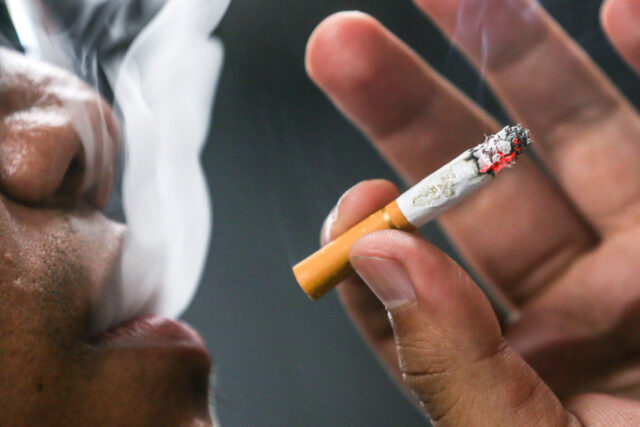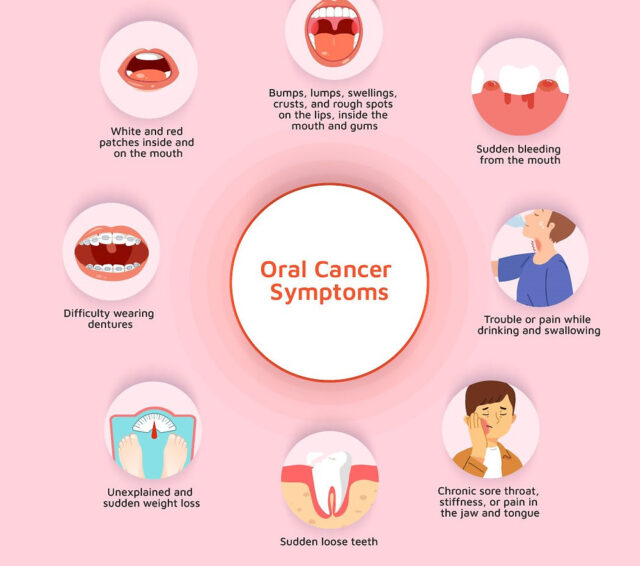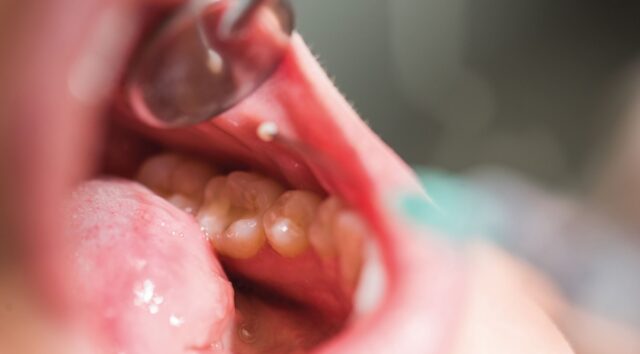
Regular visits to the dentist are important. Dentists do more than just look after your teeth and gums; they can also check for signs of oral cancer, which is best found in its early stages.
Oral cancer occurs in the throat or tissues of the mouth. It’s part of a larger category known as head and neck cancers. Most cancers in this category develop in squamous cells in your lips, tongue, and mouth.
More than 49,000 oral cancer cases are diagnosed in the United States annually. Unfortunately, they are often discovered after they have spread to the lymph nodes of the neck.

What Causes Oral Cancer?
Oral cancer is caused by the abnormal growth of cells in the mouth or throat caused by mutations in their DNA. These mutations can cause two things to happen:
- The production of oncogenes that promote the development
- Stop tumor suppressor genes that prevent cancer cells from growing
A tumor may develop once the abnormal cell growth gets out of control. Patients may also start showing symptoms.
Oral Cancer Risk Factors
Risk factors are anything that increases a person’s risk of developing a disease or cancer. They may influence the development and spread but don’t directly cause them. People with multiple risk factors are more likely to develop cancers than those with none. Several risk factors lead to the development and spread of oral cancers, some of which include:
Alcohol
Drinking alcohol is one of the most common risk factors. Drinking more alcohol puts you at greater risk of developing oral cancer.

Tobacco Products
Tobacco products like cigarettes, cigars, and pipes significantly increase your risk of developing oral cancer. The more you smoke, the higher your chances of developing it.
Non-smokers are also at risk from tobacco products. According to research published in 2013, secondhand smoking exposure as a child increases your risk of developing cancer as an adult.
Compromised Immune System
A weak immune system is another risk factor. Patients with compromised immune systems or pre-existing health conditions are more likely to develop oral cancer, especially if they have had an organ transplant or are HIV positive.
Human Papillomavirus (HPV)
HPV, a sexually transmitted infection, is linked to the development and spread of cancers in the cervix, penis, vagina, or anus. HPV-16 can also cause cancer in the tonsils or base of the tongue.
Although intended for cervical cancer prevention, research also shows that HPV vaccines may also be used to prevent oral HPV infections. However, more research is still needed.
Age and Gender
Men have a higher risk of developing oral and oropharyngeal cancers than women. People over the age of 45 also have a higher risk of developing oral cancers; however, they may develop in anyone at any age.

Poor Oral Hygiene
Not following proper oral hygiene practices and not taking care of your teeth increases your risk of developing oral cancer. Poor oral health and ongoing irritation due to ill-fitted dentures increase the risk of developing oral cancer and other oropharyngeal carcinomas.
Sun Exposure
Lip cancer is associated with prolonged, high-level exposure to the sun without protection.
Marijuana Use
Recent studies suggest marijuana users may have a higher risk of developing head and neck cancers.

Poor Diet
Not eating enough fruits and vegetables increases your risk of developing oral and oropharyngeal cancers. Chewing betel nuts, a mild stimulant from Asia, also increases a person’s chances of developing it.
Talk to your doctor or dentist about your risk factors to help you make informed decisions regarding your lifestyle and care.
Prevention is Key
As the saying goes, prevention is better than cure; and it is also true for oral cancer. Given the information about the risk factors above, we can easily deduce that the best way to prevent this is to make some adjustments to our lifestyles.
Keep in mind, though, that we’re not talking about drastic lifestyle changes but some minor tweaks just to lower your risk of having oral cancer. For instance, you don’t have to stop drinking alcohol altogether – you just have to cut down on your intake. On the other hand, smoking is definitely something you’ll have to quit to keep yourself and your loved ones safe and healthy.
The other risk factors mentioned above are pretty straightforward to handle. If you’re not eating healthy, especially if you’re immunocompromised, you just have to be smarter what you put in your mouth. Aside from eating fruits, vegetables, and other healthy foods, you may also ask your doctor or dentist for supplements. To avoid sexually transmitted diseases such as HPV, well, you just have to practice safe sex.

Signs and Symptoms of Oral Cancer
According to sunrise-dentistry.com, here are the signs of oral cancer to look out for:
- Bleeding from the mouth due to unknown causes
- Ear pain
- Difficulty swallowing, chewing, or speaking
- Tenderness or pain in the neck, face, or mouth
- Bite changes
- Weight loss
- Any lumps or bumps in your mouth
- Chronic sore throat and hoarseness in the voice
How Do Dentists Detect Oral Cancer?
Dentists often examine your mouth, gums, and teeth during checkups. They may also examine your head, neck, and other parts of your mouth for anything out of the ordinary. They will also ask about your medical history, which is a great opportunity to discuss oral cancer risk factors and other concerns that you may have.
An intra-oral and an extra-oral exam are required for oral cancer screening. Your dentist will refer you to a specialist if they suspect anything unusual.

Key Takeaway
Mutations in the squamous cells of the lips, tongue, and mouth often cause oral cancer. Several risk factors such as tobacco and alcohol use, poor diet, age, HPV infections, and weak immune systems increase a person’s chances of developing oral cancers.
One of the ways oral cancer is detected is through oral cancer screenings. Dentists often find abnormalities in your mouth during checkups, so make sure you visit them regularly to keep your oral and overall health in top shape.









